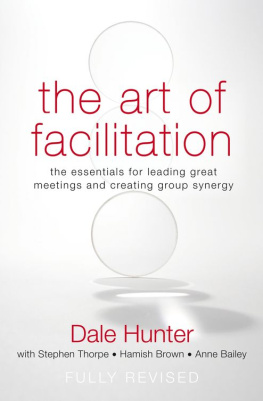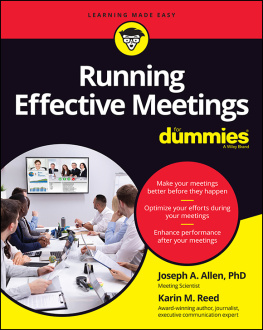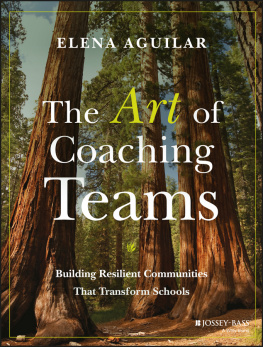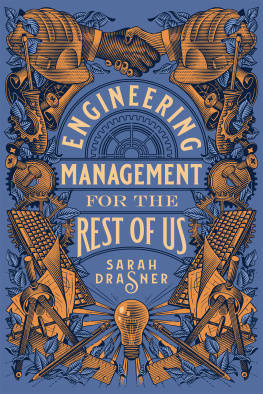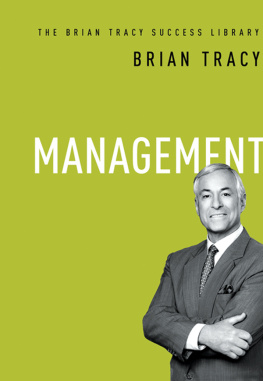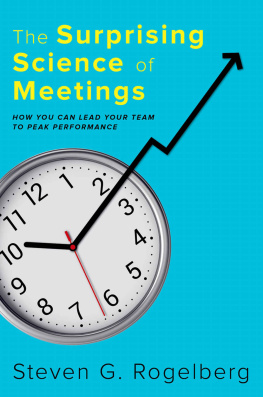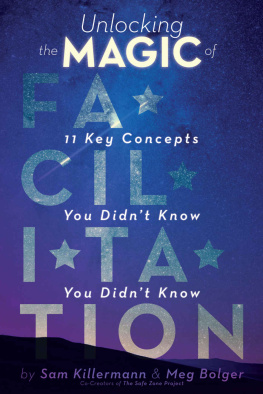Having used the original version of this book for a number of years, I found this latest version to be a practical and relevant resource for both new and veteran facilitators alike. Packed full of useful information, research and thinking, an invaluable resource to add to any facilitators toolbox. It certainly made me pause, breathe and rethink about some of my own facilitation practice; I would recommend this book to anyone in the field of professional facilitation.
Gary Austin
Senior Consultant Facilitator, circleindigo, UK
Reading and using this completely updated edition of The Art of Facilitation is, for me, an experience of pure joy, meaning and hope. Dale Hunter and colleagues are magicians in the art of enabling groups to connect with their potential and act on it so that wellbeing and sustainability can be emergent at every level, not only within organisations, but also within individuals and ecosystems. It is grounded in clear values and ethics, and a philosophy of co-operacy and caring; and its practical wisdom and tips for effectiveness are profoundly informed by lifetimes of working at the cutting edge of facilitation and change. All who work in the challenging and exciting borderlands of transformation and progressive change will certainly benefit from reading and using this best book on the topic by far.
Professor Stuart B. Hill, Foundation Chair of Social Ecology
School of Education, University of Western Sydney, Australia
This comprehensive and richly detailed account of group interactions and processes asks and answers all the right questions. The author translates her knowledge and experience into a clear and practical distillation of the power and effectiveness of good facilitation.
Catherine Lane West-Newman,
Senior Lecturer in Sociology, University of Auckland, New Zealand
Professional facilitation has one of its most prolific, holistic and integral proponents in Dr. Dale Hunter. This latest version of her popular must-read introduction to facilitation is filled with new examples, new models and new techniques from this rapidly growing profession that will be useful to students and professionals alike.
Dales long trajectory in professional facilitation, ranging from her landmark work with the Zenergy Group in New Zealand to the Global Vice-Presidency of the International Association of Facilitators, gives her a unique perspective that transcends ethnic and geographic boundaries.
With her enviable balance between wisdom and knowledge, she also balances scientific rigour with understandable pragmatism in this new edition. I whole-heartedly and unconditionally recommend this book, as I have to hundreds of my facilitation students throughout Latin America, for any person who wants to better understand and practice the art, science and technology of facilitation.
Dr. Gilbert Brenson-Lazn
Presidente Ejecutivo, Amauta International, LLC, Colombia
A big thank you to Zenergy team members Stephen Thorpe and Hamish Brown for contributing chapters to this book and to Marilyn Hunt, Sabine Druekler and Flora Wolfgram for contributing in other ways. I especially acknowledge the untiring technical assistance and good company of Stephen Thorpe on many writing retreats and days of polishing and refining. I also acknowledge Anne Bailey and Bill Taylor for their contributions.
The thinking that makes up this book is necessarily a collective effort. Many hundreds of participants in Zenergy training programmes and groups that I have facilitated or participated in have contributed to building the body of knowledge expressed in these pages. In recognition of this collective effort, scattered throughout this book are some insights from Zenergy graduates.
There are many people around the world who have inspired me and shared their wisdom with me. Many of these good folk of courage and integrity are members of the International Association of Facilitators, the Australasian Facilitators Network and the Global Facilitators Service Corps.
A special thanks to mentor Professor Stuart Hill, founding chair of Social Ecology at Hawkesbury now part of the University of Western Sydney; my lifetime peer group coaches, Bevin Fitzsimons, Marijke van Battenburg, Gill Ellis (The Group), Shirley Hardwick, Diana Elliot, Ngaire Lynch, Rachel Friedlander (now in France), the Commandos and all co-creators of the Heart Politics Network of New Zealand.
Thank you to publisher Nicola Legat and the Random House team.
I also thank and acknowledge Remedios Ruis for allowing us to reproduce her adapted description of purpose; the Department of Conservation Bay of Plenty Conservancy for allowing us to reproduce their Community Relations and Technical Support Team Charter; Lester Milbrath for allowing us to reproduce his Proposed Value Structure for a Sustainable Society; Glyn Thomas for allowing us to reproduce his Dimensions of Facilitator Education Model; the Earthsong Eco Neighbourhood for allowing us to reproduce their Group Decision Making Process from their Body Corporate Rules; and The Zhaba Facilitators Collective for allowing us to reproduce their hand signs.
Arohanui to all my family and friends, and thank you for your continuing love and support.
Dr. Dale Hunter is a group facilitator, mediator, coach and author. She is a founding director of Zenergy Ltd, a company that provides facilitation, mediation and coaching services to government, business and community sectors. More than 1400 people in New Zealand and Australia have participated in modules of the Zenergy Diploma of Facilitation, co-designed by Hunter. In addition, she has led workshops in the UK, USA, Canada, China, Malaysia and Taiwan.
Dale is the principal co-author (with Anne Bailey and Bill Taylor) of The Art of Facilitation (original edition), Handling Groups in Action: The Use of Distinctions in Facilitation, The Zen of Groups and Co-operacy A New Way of Being at Work. She has also contributed chapters to the International Association of Facilitators (IAF) Handbook of Group Facilitation and Creating a Culture of Collaboration.
Her doctoral thesis is entitled Facilitation of sustainable co-operative processes in organisations from the Social Ecology Research Group (SERG) at the University of Western Sydney, Hawkesbury, Australia. She is a former trustee of Heart Politics New Zealand, and Vice Chair International of the IAF.
Stephen Thorpe is a Zenergy facilitator specialising in online facilitation. He is undertaking a PhD in online facilitation and storytelling. He also lectures at tertiary level in computing, and is an associate editor of the IAF Group Facilitation Journal.
Hamish Brown is a group psychotherapist trained in the psychodrama method. He is also an organisational facilitator and has worked with a range of organisations throughout New Zealand and internationally. Hamish is a director of Zenergy Ltd.
Anne Bailey is a facilitator and was a founding director of Zenergy. She was a co-author of the first Art of Facilitation and also The Zen of Groups, The Essence of Facilitation and Co-operacy A New Way of Being at Work together with Dale Hunter and Bill Taylor.
Tena koe. Haere tahi tatou me enei roopu.
Welcome to everyone working in groups.
Welcome to the art of facilitation.
We invoke the spirit of cooperation through the ages past, present and future and welcome into existence the word co-operacy, a new distinction which brings forth government through cooperation.
We acknowledge Aotearoa for nurturing us, Maungawhau for watching over us, and the waters of Manukau and Waitemata for connecting us to the world.
We acknowledge our families, communities, networks and all the groups that have grown us.

